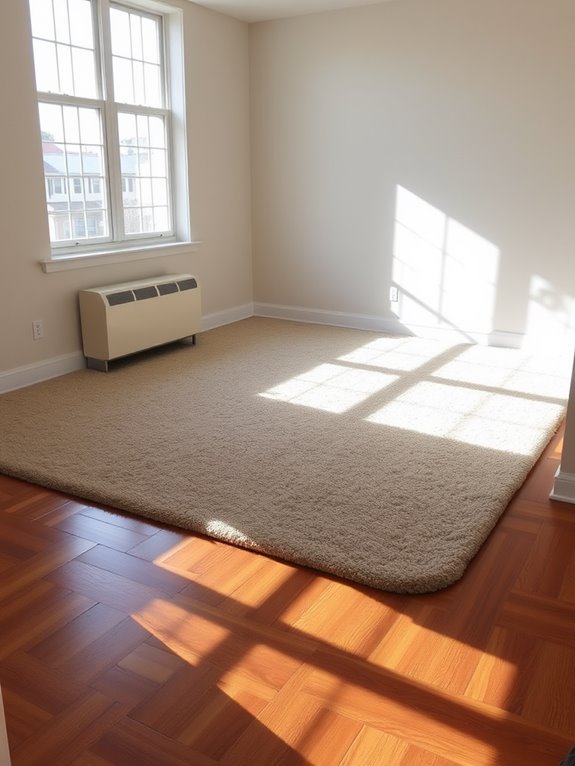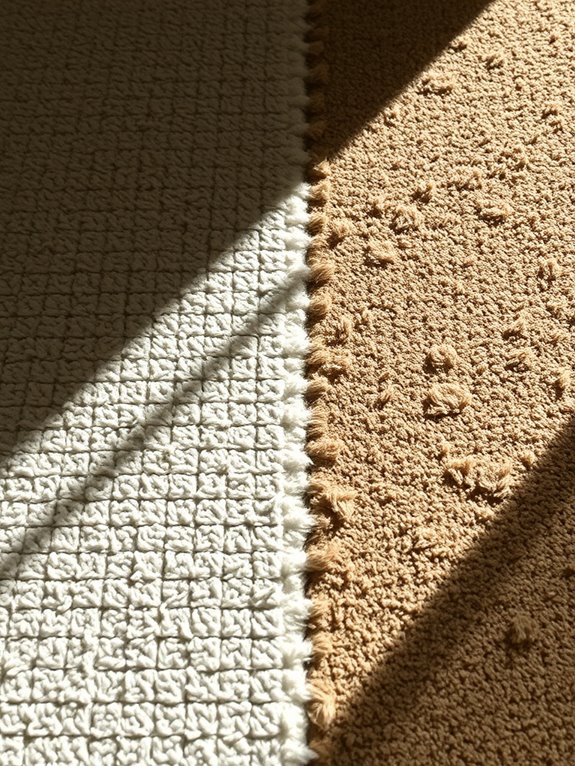Yes, carpet cleaning costs can be deducted from your security deposit, especially if the damage goes beyond normal wear and tear. Normal wear includes slight discoloration, while excessive damage like large stains or tears may incur charges. It’s important to document the carpet’s condition before moving out and be aware of state laws that protect your rights. Want to know more about what constitutes normal wear and how to avoid unfair deductions?
Understanding Security Deposits and Their Purpose

Security deposits play an essential role in the rental experience, providing landlords with financial protection against potential damages or unpaid rent.
When you sign a lease, you usually pay this upfront fee, which typically equals one month’s rent. This deposit guarantees that landlords can cover unexpected costs when you move out.
However, it’s crucial to understand that your deposit isn’t just a security blanket for the landlord; it’s also a safeguard for you, guaranteeing your landlord maintains the property.
Knowing the purpose of your security deposit helps you take better care of the property and protect your investment when it’s time to move.
Legal Grounds for Deductions From Security Deposits
When it comes time to move out, understanding the legal grounds for deductions from your security deposit can help you avoid surprises.
Familiarize yourself with what landlords can legally deduct to protect your finances. Here are four common grounds for deductions:
- Unpaid Rent: If you owe any rent, it can be deducted.
- Property Damage: Beyond normal wear and tear, damages can incur costs.
- Cleaning Fees: Excessive cleaning needs might be charged.
- Unreturned Keys: If you don’t return keys, you may face replacement fees.
Knowing these can help you prepare and negotiate effectively.
Here’s another post you might find useful: Are Carpet Cleaning Businesses Profitable? Key Insights and Success Factors
Carpet Cleaning: Normal Wear and Tear vs. Excessive Damage

While moving out, you might wonder how your carpets will affect your security deposit.
It’s essential to differentiate between normal wear and tear and excessive damage. Normal wear, like slight discoloration or minor stains, is expected and shouldn’t cost you.
However, if you’ve caused significant damage—like large stains, burns, or tears—you could be liable for the cleaning or replacement costs.
Document the carpet’s condition before you leave, taking photos to protect yourself. This way, you’ll have evidence to argue against unfair deductions from your deposit, ensuring you’re only charged for actual damage, not just regular wear.
You might also be interested in: Are Carpet Cleaning Chemicals Dangerous? What to Know for Safer Cleaning
State Laws and Regulations Regarding Carpet Cleaning Deductions
Understanding state laws and regulations regarding carpet cleaning deductions can help you protect your security deposit. Here are some key points to reflect on:
- State Variability: Laws differ by state; some allow deductions for carpet cleaning, while others don’t.
- Normal Wear and Tear: Most states recognize normal wear and tear, meaning you shouldn’t be charged for routine cleaning.
- Proper Documentation: Landlords must provide receipts for any cleaning expenses they deduct.
- Timeframe for Returns: States often have specific deadlines for returning security deposits post-move-out.
Stay informed to guarantee you’re treated fairly when moving out!
You might also be interested in: Area Rug Carpet Cleaning: A Complete Step-by-Step Guide
Best Practices for Tenants and Landlords in Handling Security Deposits

To guarantee a smooth process for both tenants and landlords, it is essential to follow best practices when handling security deposits. Clear communication about expectations, proper documentation, and timely actions can prevent disputes.
| Best Practice | Tenants’ Responsibilities | Landlords’ Responsibilities |
|---|---|---|
| Document Condition | Take photos before moving in | Provide a move-in checklist |
| Notify About Issues | Report damages promptly | Address issues within a timeline |
| Return Deposits | Provide a forwarding address | Return deposits on time |
| Itemized Deductions | Request a breakdown of charges | Provide detailed receipts |
Conclusion
In summary, maneuvering through the nuances of security deposits can be tricky. By understanding the fine line between normal wear and tear versus excessive damage, you can protect your pocketbook. Whether you’re a tenant tackling a tricky situation or a landlord looking to safeguard your space, staying informed helps guarantee a fair and friendly resolution. Remember, clarity and communication are key to cultivating a cooperative relationship, making the process smoother for everyone involved.

I’m Allen Kim, the chief editor of plumbinginto. I am a mid level plumber and assign to an local firm over 4 years of experience. During the working period, most of my experience is related to the house plumbing. I learned about the thing, when working with most experienced people in this sector, one must be as good as the inspector or better with knowledge of the project as well as the practical aspects of plumbing industry.